08 May2020
By Linda Minor

Have you thought about getting more involved with AACTE? Have you considered submitting a proposal or being a reviewer for the 2021 Annual Meeting? Well now is the time. AACTE has extended the deadlines for reviewers and proposals:
Call for Reviewers deadline has been extended until May 27. Peer Reviewers serve an important role in the Annual Meeting by ensuring that exemplary learning opportunities are selected from the proposals submitted. Applicants will be notified by June 19 and asked to review up to 10 proposals between June 19 – July 29. And don’t forget, you can still submit an Annual Meeting proposal, even while serving as a reviewer. Read the full call for proposals, then apply to review proposals.
05 May2020
By Jerrica Thurman
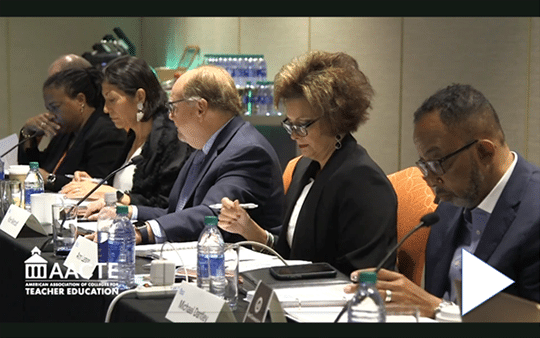
Here is your opportunity to engage with AACTE! The Association is currently accepting 2021 Annual Meeting session proposals and reviewer applications, nominations to serve on AACTE Committees, 2021 award nominations, and voting on revisions to the Association’s bylaws and articles of incorporation. With so many opportunities available, will you answer the call to serve the profession?
Each call to action has its own deadline, so be sure to mark your calendar and click on the links below for more information:
28 Apr2020
By Katrina Norfleet
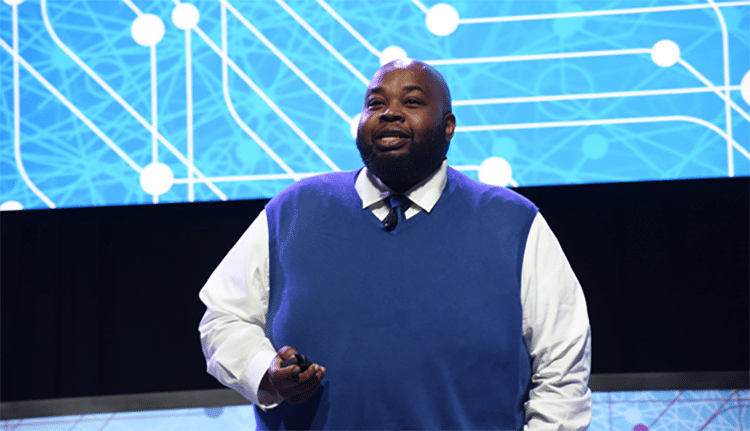
The AACTE 72nd Annual Meeting culminated with a Closing Session keynote address by 2019 National Teacher of the Year Rodney Robinson, a Richmond, Virginia, 18-year veteran educator who has developed programs to prevent students from entering the school-to-prison pipeline. Robinson shared how he uses culturally responsive curriculum and the whole child approach to learning in educating vulnerable students.
In talking about inequity, Robinson spoke about two different types: resource inequity and cultural inequity. During a tour of schools in Southwest Virginia, he noted the differences in resources. “It’s mind boggling. We went to some schools with 21st century buildings, state-of-the-art high-speed internet. Kids were using STEM boxes to plant agriculture, kids were using drones to to study space. And then we would go 30 miles down the road and buildings don’t even have AC, no high-speed internet; one school district didn’t even have text books.” He was challenged to advocate for these types of inequities between rural and urban schools.
27 Apr2020
By Matthew Wales

The AACTE Annual Meeting is the premier educator preparation conference in the nation. Each year, the conference provides a forum for educators to engage in meaningful discussions, share research and practices, and become better equipped to drive change in the educator preparation field. And with the 2021 Annual Meeting theme of “Resisting Hate, Restoring Hope: Engaging in Courageous Actions,” the profession will continues its 2020 mission to join together in a united effort to disrupt inequities while educating for inclusion and change.
Peer Reviewers serve an important role in ensuring that exemplary learning opportunities are selected from the proposals submitted. Since the Annual Meeting offers attendees a wide breadth and depth of content and learning experiences, peer reviewers from a background of areas from within the educator preparation field are essential. AACTE encourages you to shape the focus of the 2021 Annual Meeting by volunteering to serve as a peer reviewer.
Timeline for a Reviewer Application
- Applications are due by Wednesday, May 13 at 11:59 p.m. PT
- Approved applicants will be notified on or before Friday, June 5 at 11:59 p.m. PT
24 Apr2020
By Renée A. Middleton
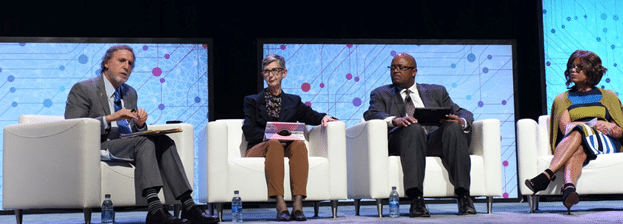
On Feb. 29, my colleagues and I had the honor of delivering the Deeper Dive presentation, “Combating Discrimination and Hatred Through Education,” at AACTE’s 72nd Annual Meeting in Atlanta. This experience was a wonderful opportunity to help deans of education and other educational leaders understand the important role that they play—not only in shaping curriculum, but also in making the world a better place.
Hate exists because people do not understand each other and want to “other-ize.” Well, the most effective way to eliminate hate is through education, and I believe the Deeper Dive presentation underscored that message.
I, along with Rick Ginsberg (University of Kansas), Marvin Lynn (Portland State University), Margaret Grogan (Chapman University), and David Machlis (Adelphi University). presented about the Holocaust—how it happened, why it happened, and how educators should approach this type of subject matter in schools. Connecting the past to the present is not always easy, but it is imperative to prepare students to be active and informed citizens.
24 Apr2020
By Nakisha Whittington
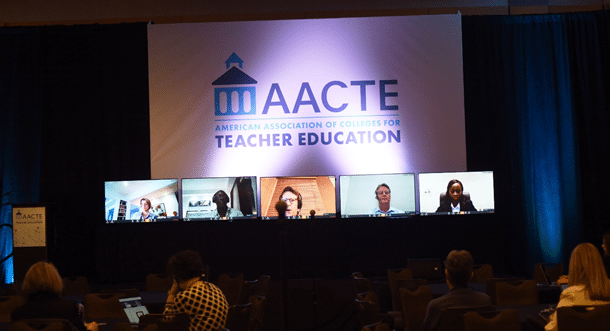
At the AACTE 72nd Annual Meeting held in Atlanta, GA, educators from all over the world had the opportunity to share their research and practitioner journey through conversations around diversity, culturally sustaining pedagogy, and innovations in teaching and learning. In a session, “Transforming the Educational Workforce,” moderator Carole Basile of Arizona State University (ASU) presented the international panelists via Zoom: Liesbet Steer of the Education Commission, education program and evaluation specialist Kingsley Arkorful from Ghana, Paul Atherton of Fab Inc., and Dale Johnson and Ukiah Malambo of ASU.
The international team provided a snapshot of how adaptive technology can better support students in countries like Vietnam. Arkorful led the discussion around the Education Workforce Initiative (EWI). This project aims to turn the Education Commissions’ Learning Generation recommendation on expanding strengthening, and diversifying the education workforce into action that will harness the latest evidence and innovations to inform new ways of approaching education workforce design to improve learning outcomes for this century.
24 Apr2020
By Ward Cummings
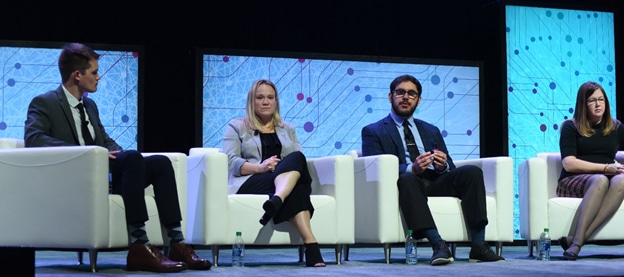
Deeper Dive: Understanding the Preventative and Responsive Trends in Campus Safety
For decades, students, teachers, and parents have lived with the reality of campus violence, particularly gun violence. It is clear that meaningful action is needed to keep our schools safe, and to prevent violence from occurring in the first place. Educators have a special responsibility to lead on this issue. Across the country educators are joining community and political leaders in search of a multi-faceted approach to intervene, prevent, and respond to school-based violence.
During the 2020 Annual Meeting, a panel for explored this topic during the “School Safety Matters” Deeper Dive session, beginning with a national overview of the state of gun violence on school and college campuses. The presenters discussed policy levers used to address this violence and acquainted attendees with the tools and strategies being used to prevent and respond to school-based gun violence. Moderator Ben Erwin of the Education Commission of the States (ECS) facilitated the discussion between his ECS colleague, Zeke Perez, Amanda Fitzgerald from the American School Counselor Association and Elizabeth Brown, principal of Forest High School in Ocala, FL.
16 Apr2020
By Maria Salazar and Bryant Jensen
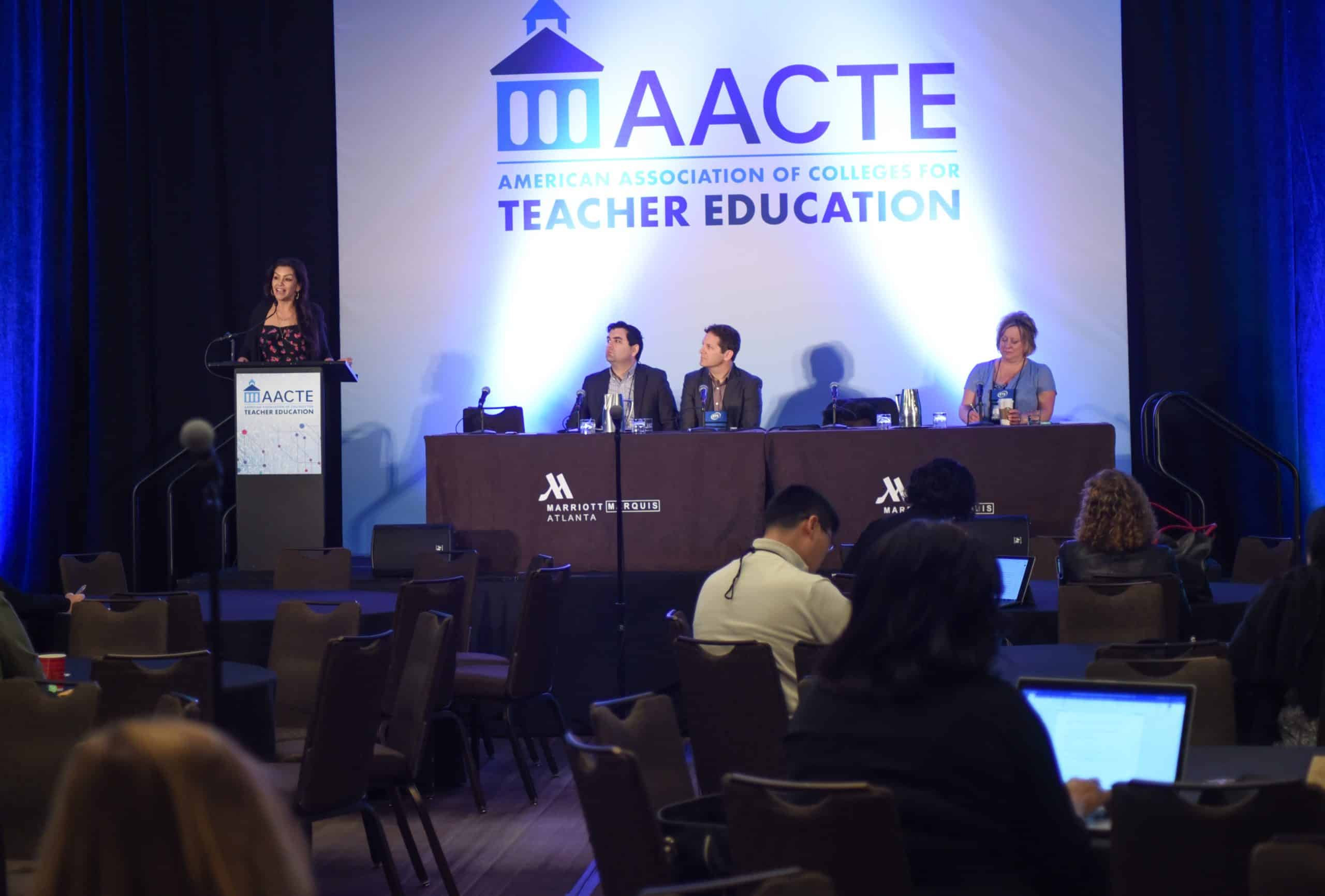
As presenters at the AACTE 2020 Annual Meeting Deeper Dive: Challenges of Immigration and Teacher Education, the authors offer a recap and reflection of the session.
“Quisieron enterrarnos, pero no sabían que éramos semillas” is a Mexican proverb translated as “They wanted to bury us, but they did not know that we were seeds.” This proverb captures the current experience of many immigrants and their children in U.S. society. Immigrants in the United States and around the world are being “buried” under policies and practices that violate their human rights, yet immigrant students and families remain incredibly resilient. Immigrant families draw on sociocultural assets to persevere through setbacks. These conditions have direct implications for teacher education in the U.S. and abroad.
Given the large numbers of immigrants of Latinx descent in the United States, we focus our commentary on Mexican and Mexican American communities. Two-thirds of the U.S. Latinx community is of Mexican origin, and one in seven of all U.S. students in elementary and secondary schools has a Mexican-born parent or grandparent (Jensen & Sawyer, 2013; Passel, 2011). The United States shares many of these immigrant children and youth with its neighbor to the south, México. Indeed, the fastest-growing group of “students we share” between our two countries are U.S.-born students of Mexican heritage living in Mexico and struggling to integrate into Mexican schools (Gándara, 2020).
15 Apr2020
By Carole Basile
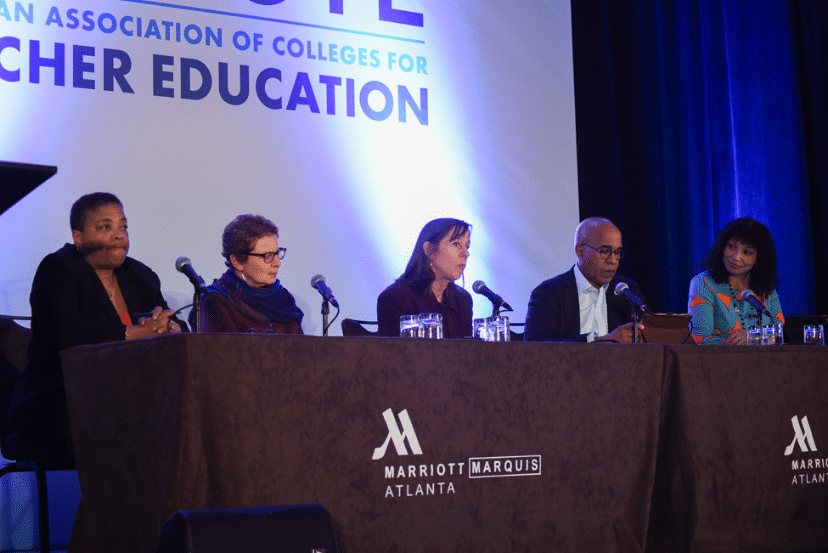
During the AACTE 2020 Annual Meeting in Atlanta, I had the pleasure of serving on the panel of the “Disruptive Deans” Deeper Dive Session along with three fellow deans. Our challenges are disrupting the one-teacher one-classroom model, closing the uneven admissions pathways between community colleges and 4-year institutions, breaking the traditional mindsets of hiring practices, and questioning the biases of traditional learning environments. These are no small tasks.
During the Disruptive Deans Deeper Dive session, the panel covered the following topics:
- “Building the next education workforce”—(I presented this topic.)
- “Designing a clear transfer model in the state of Oregon for community college transfer and increasing the number of teachers of color and bilingual students,” presented by Cecilia Monto, dean, Education and Humanities, Chemeketa Community College.
- “Hiring and retaining faculty of color,” presented by Don Pope-Davis, dean, College of Education and Human Ecology, The Ohio State University
- “Promoting understanding of the social justice imperative of educating teachers to educate all learners including those who are neuro-divergent,” presented by Kimberly White-Smith, dean, LaFetra College of Education, University of La Verne
Our moderator, (also a disruptor) Wanda J. Blanchett, dean, Rutgers University, has led a distinguished career promoting equity and inclusion for all.
17 Mar2020
By Jerrica Thurman

The AACTE 2020 Annual Meeting Opening keynote speaker Robin DiAngelo, associate professor of education at the University of Washington, is widely recognized for her research in critical discourse analysis and whiteness studies. In her address, she explored how to implement strategic, intentional anti-racist actions to interrupt the system of racism in education. Her message aligns with AACTE’s core value of diversity, equity, and inclusion an integral part of AACTE’s strategic plan for 2020-23.
“The status quo of this society is racism; it is not an aberration, it’s the norm. All of our institutions effectively and efficiently reproduce racial inequality and schools are the bellies of the beast,” said DiAngelo. She noted that the concept examining the dominant culture is consistently left off the table in the conversation when discussing race issues. These discussions tend to focus on learning about other racial groups.
During her talk, she emphasized the need to decenter “whiteness” by naming it and exposing it, explaining that there is a white worldview, a white frame of reference that allowed her to move through the world from a white experience. DiAngelo shared, “Being white, I was not raised to see myself in racial terms” She reasoned that as a white person, “when we talk about race it’s about their race not mine.” She acknowledged the complexities of racism and the inability to understand every nuance. “But it’s on me to get that information, not on people of color to hand it to us.”
17 Mar2020
By Timara Davis and Sacha Cartegena

The national teacher shortage has required all stakeholders to take action. What do we know and what can we do? The Annual Meeting “Addressing the Teacher Shortage” Deeper Dive session brought together a panel of experts to discuss the alarming data on and present strategies to combat this epidemic. The panel consisted of AACTE consultants Jacqueline King and Jane West; Zeke Perez, policy analyst, Education Commission of the States; and AACTE board member Marquita Grenot-Scheyer from the Office of the Chancellor at the California State University System.
Jacqueline Rodriguez, vice president, program and professional learning at AACTE, served as the moderator. She began the session by providing a national overview as it relates to the teacher shortage by highlighting, “As a Nation, we have …
- A decline in enrollment in teacher preparation programs;
- Significant lack of diversity in our educators: race, ethnicity, gender, identity, disability;
- High poverty schools which experience disproportionate teacher shortages;
- Schools with high enrollment of students of color more likely to employ uncertified teachers; and
- Teacher turnover at a significant high financial cost.
16 Mar2020
By AACTE
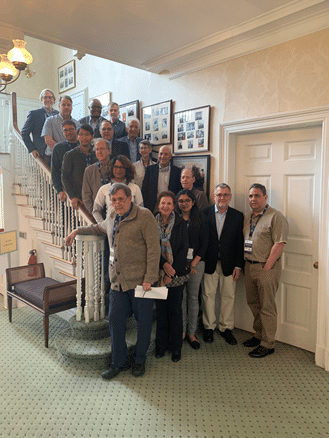 An excerpt from this article appeared in District Administration on March 11.
An excerpt from this article appeared in District Administration on March 11.
Today, we live in a society where truth is decaying, falsehoods are readily shared across social media, and hatred and discrimination are on the rise. According to the Southern Poverty Law Center the number of hate groups operating in the United States hit a record high in 2018. Hate speech creates an environment in which biases and discrimination thrive and can have a detrimental impact on a school’s culture and climate. Teaching and learning about the roots of hate are important elements in fostering an inclusive classroom environment.
Teachers play an essential role in creating a more humane and tolerant world. They are stewards of culture and are in a position to protect history, promote facts and prevent inhumanity. However, to provide students with the most effective instruction, educators must have the tools to understand the nature of hate crimes and how they impact the culture and climate of schools where they teach. Additionally, they must know how to address issues of bias and discrimination in the classroom.
04 Mar2020
By Dustin Wunderlich
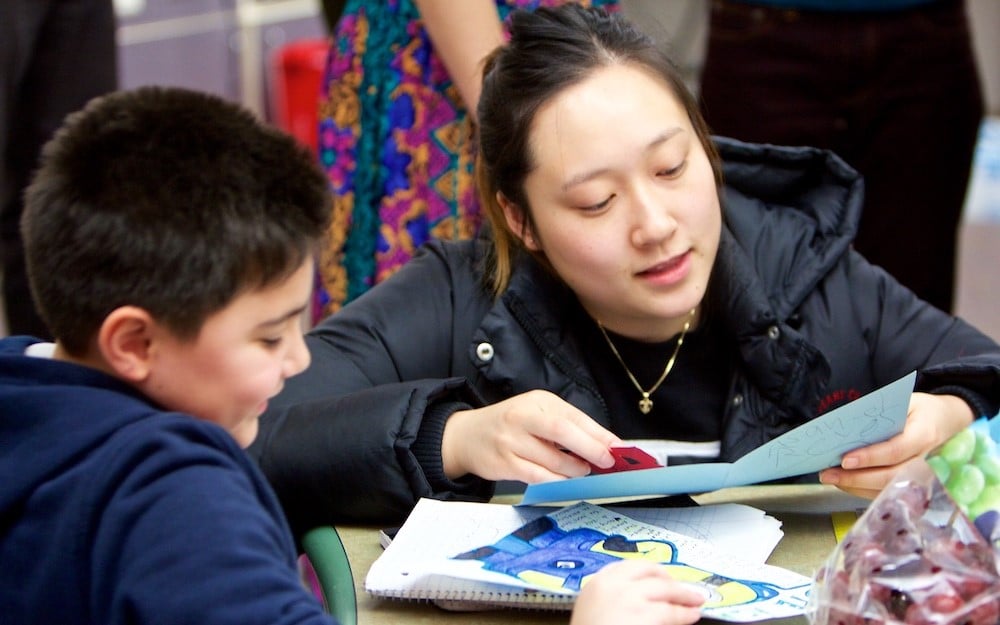
This article originally appeared on the University of Washington College of Education website and is reprinted with permission.
Back in 2017, the University of Washington’s Elementary Teacher Education Program (ELTEP) enrolled its first cohort of teacher candidates in which more than half were people of color and more than half spoke a language in addition to English.
While the diversity of the cohort was welcome — particularly in a state where 89 percent of teachers are white but students of color make up nearly 50 percent of public school enrollment — it also meant UW teacher educators needed to reassess their program.
“When we admitted our first group of very diverse students, I went to the faculty and said ‘We’ve got a gift’,” said Teddi Beam-Conroy, director of the UW’s Elementary Teacher Education Program. “Most efforts [to diversify the teaching workforce] concentrate on recruiting students, and they’re here. So now we have to talk about how we’re going to change to meet their needs. What do we need to do in order to sustain and learn from the students we have with us?”
03 Mar2020
By Katrina Norfleet
AACTE says “thank you” to the AACTE members, partners, and supporters who attended the 2020 Annual Meeting in Atlanta February 28-March 1! Your presence was vital to exploring this our theme, “Disrupting Inequities: Educating for Change” during AACTE’s 72nd national conference.
Over the coming weeks, Ed Prep Matters will offer you a range of Annual Meeting coverage. Meanwhile, take a moment to view (and share!) conference photos and conversations on the AACTE Twitter feed using #AACTE20, and enjoy the following recap videos:
Highlights – Friday February 28
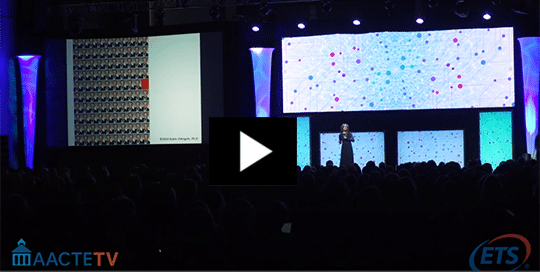
03 Mar2020
By Katrina Norfleet
During the AACTE 72nd Annual Meeting attendees went viral on Twitter using #AACTE20—tweeting, retweeting, and, liking posts over the 3 days in Atlanta! From presenters, to Holmes Scholars, to session attendees, hundreds of contributors shared photos of event activities. Thanks to the flurry of social media activity, close to 1,000 conversations took place on Twitter while participants were “Disrupting Inequities: Educating for change.”
Check out a selection of posts below. To see the full volume of tweets, visit us on Twitter at #AACTE20.



















 An excerpt from this article appeared in
An excerpt from this article appeared in 

